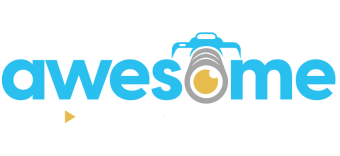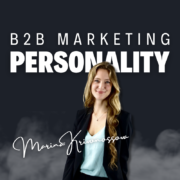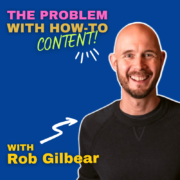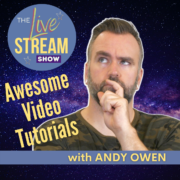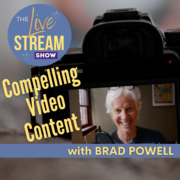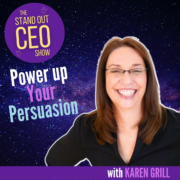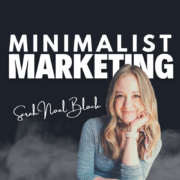152. How to put more personality into your marketing with Marina Krivonossova
Want to know how to make your B2B marketing stand out? In this episode: discover how you can unlock the power of putting personality into your marketing.
If you’ve been struggling to bring a more human face to your marketing, stay tuned because I invited content marketing expert, Marina Krivonossova, to guide us through her approach to bringing personality into your marketing in a way that not only attracts your audience but convinces them to take a chance on you.
Marina’s the founder of Retold Agency where she provides strategic B2B content marketing
Key Takeaways
- The secrets of infusing personality into your LinkedIn content
- How sharing personal stories can build genuine connections and foster meaningful business relationships
- Integrating personal experiences and everyday moments into your storytelling.
Resources
Connect with Marina Krivonossova
Schedule a ‘Stand Out on Video’ call with me and see how you can start building trust & authority AND earning that bigger check by being more yourself on video.
Whenever you’re ready:
I help business leaders, consultants & coaches create a short-form video sales system that makes selling easy.
In a 1-hour remote interview you get 1 month of short form video content that does your selling for you – scheduled across all your social media channels.
Imagine having dream clients excited to buy from you because they’ve been pre-sold by your videos.
Transcript
Marina Krivonossova:
you’ve probably gone to some kind of networking dinner where you’re trying to, you know, schmooze a potential partner company. Where you’re trying to prove to a potential partner company like, hey, look, we’re really great, we’re awesome to work with, you, should work with us, and odds are you’re not just sitting there at that dinner for three hours being like look at our forklift pictures, look at our forklift videos. That, look at our forklift videos. That’s probably not what you’re doing. You’re probably asking oh, hey, man, how was your trip here? How was the wife doing? How are the kids? You know what I mean.
Marina Krivonossova:
You’re probably having those more intimate conversations. You’re probably connecting on the basis of did you watch the game last night? Oh, wow, you know, your outfit’s awesome, I really like your outfit. Where’d you get it? You’re having those human conversations and, at the end of the day, yes, it matters what you do for business, it matters how good your product offering is. The stats matter, the facts matter, but those personal relationships are going to play a huge role in whether or not those potential partners turn into real, concrete, contract signed partners. And I look at B2B networking on LinkedIn and B2B content creation in the exact same way. You have this opportunity to stand out without even needing to be at those networking dinners. You can do it from the comfort of your own home, or from the comfort of Tahiti, or from the comfort of your local cafe really anywhere you want, if you take advantage of using personality in your content on LinkedIn and just online in general.
Brad Powell:
Welcome to the Standout Business Show, where it’s all about making a bigger difference by doing business differently. I’m Brad Powell, and if you’ve been struggling to bring a more human face into your marketing, stay tuned, because I’ve invited content marketing expert Marina Krivonosova to guide us through her approach to bringing personality into your marketing in a way that not only attracts your audience but convinces them to take a chance on you. I’m really excited to have her on today. I’ve been watching her LinkedIn feed. She does an amazing job of bringing her personality to her content and has gained a pretty significant following, and she’s a really good example of somebody who’s standing out as a Russian-American who’s now living in the Netherlands. Talk about standing out just by who you are. Marina is the founder of Retold Agency, where she provides strategic B2B content marketing, and with that let’s start the show. All right, marina, welcome to the show.
Marina Krivonossova:
Hi Brad, Thanks so much. It’s great to be here.
Brad Powell:
Well, let’s start at a place where I have been scoping out your LinkedIn profile and the content that you’ve been doing there, and what I’m noticing, which is really great, is that you are really good at sharing a lot of stories.
Brad Powell:
This is something that I just don’t think very many people are doing, and if they’re trying to do it, they may not be doing it particularly well. When you think about putting out content, most people it seems like what they’re doing is they’re thinking first of all, well, I need to tell people about what I do, so their information that they’re sharing is, first and foremost, all about them and their thing. And then the second place that they might go to is like well, actually, why don’t? I’ve heard that I should give value, and so they’ll get into sort of a teacher mode and let’s say let me show you how the best way to do this amazing thing that was going to solve all the problems in your life. I’m going to teach you how to do it. And amazing thing that was going to solve all the problems in your life. I’m going to teach you how to do it, and that is what’s going to work for me, and yet your approach is really quite distinctive from that.
Marina Krivonossova:
So talk about that a little bit. Storytelling is a huge part of what I do, and I think in B2B and in B2C, but you know I work primarily in B2B. I think it’s just integral. When I create content for LinkedIn, whether it be for myself or for my clients, I really focus on the storytelling element. And what do I mean by that? I mean sharing stories, sharing experiences, sharing lessons in a way that’s relatable to your audience, in a way that you know your audience member will see it and they’re going to read it and they’re going to be like oh, wow, okay, I get what you’re saying. That really vibes with me.
Marina Krivonossova:
That kind of stands out to me as opposed to, maybe, a fact sheet that just says you know 10 content marketing hacks and people see that and they’re like, okay, well, the other guy also shared 10 of his favorite content marketing hacks and the girl after him also shared 10 of her favorite content marketing hacks. So everything kind of blends together and there’s so much noise, people are creating so much content and when all of it’s identical or more or less identical which is what happens when you’re sharing just facts. People are not going to notice it, they’re not going to remember you, they’re not going to remember what you do and they’re not going to remember your name, which is why I bring stories into the mix. So, as you mentioned when you were introducing me, you know I’m a russian american living in the netherlands and that’s something that makes me stand out.
Marina Krivonossova:
There’s plenty of russian americans in the netherlands. Actually, you might not realize it, there’s many of us. But when I use that as part of the story I tell on linkedin, people are like oh, that’s right, she did that. You know, we can also talk about that, we can bond over that. But what is it she does for work? Again, you know, I know her, I recognize her, I trust her as an expert in her field, and that’s what makes me stand out.
Brad Powell:
I would say yeah, I think just one key there is just simply bringing little elements of yourself into your content, and it doesn’t have to be anything. I mean, a lot of people think when they think about storytelling is that they have to tell some kind of epic journey that they were on.
Marina Krivonossova:
Yeah, I hear that a lot.
Brad Powell:
They climbed a mountain or they had a car crash or like all these sort of big events, life events and that’s the story they need to tell, and I really think that a key is looking for just the little things that make you human. Just as an example, I was talking about a time when I was watching Cinderella with my daughter and we’re sitting there on the living room couch and we’re eating popcorn and I really like that time. I just enjoy the time. It doesn’t almost matter what we’re watching, but if it happens to be a film that’s teaching a good story, that’s showing something good about what it’s like to grow up as a strong woman and that is helpful to my daughter, that’s great. But mainly what it is is I just like connecting with my daughter, like spending time with her and hanging out and reading popcorn together. What could be better by sharing that you know eating popcorn together. What could be better by sharing that you know there’s all this stuff out there that people go oh, brad has a daughter.
Brad Powell:
Yeah that’s the kind of guy who likes to watch movies with his daughter. You know, and even if the person who is watching me doesn’t have a daughter, like we’re not connecting on that level. It’s just simply that if they’re the kind of person that admires someone who’s a dad who’s spending time with their daughter, great, like it just creates a human connection with me and anyone else who might be paying attention.
Marina Krivonossova:
Yeah, that’s absolutely real. I was just discussing that with a LinkedIn friend the other day, because he posts a lot with his dog. He posts a lot of photos and videos just where his dog’s part of it. You know he posts a lot with his dog. He posts a lot of photos and videos just where his dog’s part of it. You know he’ll be talking about his experiences at work, but his dog will be in the shot.
Marina Krivonossova:
And I straight up told him like I think people who love animals and who really love their pets are just, you know, inherently wonderful people. So when I see him post that content I don’t have a dog, I think animals are great, but when I see him, you know, form that connection with his dog, I’m like, okay, that’s a good guy, that’s a guy I can trust, that’s a guy I can trust with my business work. So it’s one of those things that you know he might not even have thought about it. He was just like, oh, yeah, I hang out a lot with my dog. This is nice to post, but I’m like you’re literally telling your story. When you do that, You’re sharing a part of who you are and you’re connecting with people who might not have that thing in common with you. You know owning that pet, but the emotions and the feelings around it like those will be there and those will help you connect with people.
Brad Powell:
Yeah, so when you are looking for people material, you know, story ideas you know and again, like I’ve seen your feed, you’re very prolific. What’s your process in coming up with ideas? Like, how do you come up with many different things to share that keep your content feed fairly full and interesting, like actually quite entertaining?
Marina Krivonossova:
I feel like the thing with a marketer’s brain is that it’s on 24, seven, whether you like it or not, and I’m talking about weekends, I’m talking about holidays, like, even if I’m not on my phone, I’m not on social media, I’m with my family on a beach somewhere, the marketer’s brain just doesn’t turn, turn off. You know, I try, I try very hard to disconnect fully from my work, but it doesn’t always work. So, something that I like to do when I’m not working, I’m just enjoying my life. I’m out on a walk, I’m on vacation, you know, I’m hanging out with people.
Marina Krivonossova:
If I get a random idea and they’re random, if you work in creative field, like you get me when I say those ideas, they just show up. You don’t know why, you don’t know where they came from, but they show up and I just track them. I write down my random thoughts on my notepad, on my phone. I never expand on them in that moment. I’m not, you know, at a beach to work, but if I have my phone on me, I just happen to have it there and an idea comes to mind, I’ll just jot it down. And when I’m in the mood to create content or when it’s just time for me to create my own content. I’ll sit down with my notepad, I’ll look through those ideas and I’ll see what stands out to me then and I’ll elaborate on those topics. And I’ve been doing that for years and it works so well for me.
Brad Powell:
Yeah, that’s great. There’s a local storyteller, kind of a storytelling champion, a guy by the name of Matthew Dix. He’s written a wonderful book called Storyworthy. He lives down in Connecticut and there’s a competition called the Moth, which is a storytelling open mic kind of thing, and in the evening storytellers get up and it’s competitive, like somebody gets chosen as telling the best story in the evening and then the ones who told the very best stories of a particular evening get to be in a much bigger regional or national competition and then they can win, like the national championship moth storytelling thing. He’s won that multiple times, this guy.
Brad Powell:
He’s quite good storyteller and he talks about his process for gathering ideas, which is just like what you’re talking about, only he formalizes it in that at the end of the day he’ll basically just say well, what happened? If someone said I’ll give you $10,000 to tell me the story of the day, what’s that story? And he’ll just make a note of it like just one line of the day, what’s that story? And he’ll just make a note of it like just one line. And he says he’s got a Excel spreadsheet that now, because he’s been doing it for years, is just filled with tons of story ideas, most of which he’ll never have time to tell. The cool part is when you do that and tell me if this is true for you, like he’s remembering bits of his life and the story could be something that happened that day, but it could also just be something that triggered a memory of something from the past and that becomes the story that you’re telling. What he’s doing is he’s basically preserving all these parts of his life experience that otherwise he would have completely forgotten about.
Marina Krivonossova:
I definitely feel that. I’ve noticed that sometimes when I look through my old LinkedIn posts and I’m like, oh yeah, that was an experience I had. That was like a thing I encountered during my travels or when I was like visiting a friend or something and otherwise, yeah, I never would have even thought to remember it or document it, because it seems really insignificant to an extent. But even if there’s a little story, if there’s a little lesson to attach to it, it seems really insignificant to an extent. But even if there’s a little story, if there’s a little lesson to attach to it, it’s worth sharing. So I very much noticed that I have those moments that I’m like, oh yeah, that was worth writing about then. So I wrote about it, but otherwise I probably wouldn’t even remember it happened.
Brad Powell:
Yeah, exactly, it’s a way to sort of really extend your life in terms of just your life experience, and so people think about this as sort of a chore that they have to do to like I need to put content out. Therefore, I’m going to go through this process and it feels like a big job and it’s a lot of work, but there’s this other valuable thing that seems to happen, which is speaking from a just life success point. Yeah, this is really valuable thing that, if you do it, you’re going to find some really wonderful, remarkable change in how you see your life experience and how you remember things that are actually pretty important.
Marina Krivonossova:
And I always tell people on that note that if you’re struggling that much to write content and if you think it’s always boring and tedious to create it, you really need to reevaluate not only the way you’re approaching your content but the sort of things you’re writing about. Because if you’re already that miserable creating it, imagine how miserable your audience is going to be when they have to read it and they’re not going to read it. They’re going to scroll right past it if it’s as boring as you think it is.
Brad Powell:
Oh yeah, that’s really good. That’s a really good attitude, All right. Well, talking about that in terms of you know, there are tons of people in the business world and we’re speaking particularly to the B2B business world who just have tons of resistance to doing this kind of thing. I mean, I know, in my work where I’m trying to get people not only to share content but to share it on video, you know I get with them, we do an interview like this and I’m asking them questions. They gave me the responses and that those responses. My job is to pull out their best stuff. And’t want to be here, I don’t want to be on camera. And so, in your experience in meeting that kind of resistance, like, how do you overcome it? How do you work with people?
Marina Krivonossova:
So my best example that I always mention to business leaders in the B2B space is this You’ve probably gone to some kind of networking dinner where you’re trying to, you know, schmooze a potential partner company. Where you’re trying to prove to a potential partner company like, hey, look, we’re really great, we’re awesome to work with, you should work with us. And odds are, you’re not just sitting there at that dinner for three hours being like look at our forklift pictures, look at our forklift videos. That’s probably not what you’re doing. You’re probably asking oh, hey, man, how was your trip here? How was the wife doing? How are the kids? You know what I mean.
Marina Krivonossova:
You’re probably having those more intimate conversations. You’re probably connecting on the basis of did you watch the game last night? Oh, wow, you know, your outfit’s awesome, I really like your outfit. Where’d you get it? You’re having those human conversations and, at the end of the day, yes, it matters what you do for business, it matters how good your product offering is. The stats matter, the facts matter, but those personal relationships are going to play a huge role in whether or not those potential partners turn into real, concrete, contract signed partners. And I look at B2B networking on LinkedIn and B2B content creation in the exact same way. You have this opportunity to stand out without even needing to be at those networking dinners. You can do it from the comfort of your own home, or from the comfort of Tahiti, or from the comfort of your local cafe really anywhere you want If you take advantage of using personality in your content on LinkedIn and just online in general.
Brad Powell:
No need to go to networking events anymore. Imagine that. That’s so great, all right. So when you are coaching someone in terms of bringing story into their content, what is the format or the method that you are helping them use in terms of doing that? Because I’ve heard many different ways to approach it. The school version of story is that they all have a beginning, a middle and an end, and then there’s a lot of variations beyond that that are more sophisticated. We’re not looking for the hero’s journey of I don’t know, 12 to 16 stages. That’s too complicated In a piece of content. It can be fairly simple to bring story into what you’re expressing and also, in a way, tie it to the change that you’re making or the transformation that you’re that you and your product and your service are offering. Have the story be the vehicle that connects people to that change. So how do you, when we’re talking to someone, to say, well, here’s how to think about how to use your story in your presentation. What do you say to them?
Marina Krivonossova:
I find that the hardest thing at least for the people who usually approach me for this kind of service and for the clients I’ve worked with I find that the hardest thing is really figuring out what stories are relevant and which stories need to be used. They don’t know which questions to ask themselves to come up with those ideas, which is where I step in. I have like an extensive list of questions we can go through. That’ll really get the cogs turning. That’ll really get those idea juices flowing, and I think once they get those, they’re usually kind of feeling warmed up to start telling the stories. And beyond that we’ll be like okay, well, how can we tie this to the lessons you want to share with your audience? And it’s kind of a little mix and match thing.
Marina Krivonossova:
So, for instance, I’ll ask something like you know what was the most life changing moment you’ve ever experienced? And that also gets you kind of learning what kind of person you’re working with, because some people will immediately think it was a teacher I had in elementary school and somebody will be like well, it was actually the car crash I got into five years ago. And you’ll hear all these fantastic stories that really are life changing. And then you’re like, okay, great, that’s the moment, that’s what we’re going to talk about.
Marina Krivonossova:
And then we sit down and think well, what ideas do you want to convey through the work you do? How do you want people to perceive you? What kind of image do you want to create? And it’s not to say you’ll be fabricating anything, but it’s more of deciding how do you approach telling those stories that you want to tell. What do you want the outcome to be? So we’ll usually go through that brainstorming process together and I find that makes a huge difference and it also helps them get to know me better and it helps me get to know them better. And once you connect on that human level which is what all of this is about I find the results you achieve are just all the more fruitful.
Brad Powell:
Yeah, it’s interesting about the questioning. I was hearing some people talking about artificial intelligence. Right now, the language models are really good at coming up with answers to certain kinds of things. Not always, sometimes they’ll tell you an answer that’s completely made up, but they’re getting better and better. This is going to be something they’re going to become like really really good at is the answers to lots of questions, and so if you want to do something like build a building and instead of going to an engineer and saying, well, what are the structural requirements of this building, the language model is going to tell you all that stuff and calculate it really quickly and save you a lot of time and money in the process.
Brad Powell:
However, the point that was being made is but they’re not good at asking questions themselves. And this is where, no matter what you’re thinking in terms of the future and the value of your job and the work you do anyone who is really good at coming up with creative questions you’re going to maintain your value on into the future, no matter what.
Marina Krivonossova:
Absolutely and to kind of build on that. Ai is great at the concrete things, as you say. It can give instructions on how to build this, how to write this, but it can’t replicate human emotion. It can learn from the stories people share online, but at the end of the day, your experiences are unique. They’re a part of what make you you and nobody can replicate that. You know what I mean. So, no matter what AI does, you’ll always have a leg up if you’re willing to share those unique experiences.
Brad Powell:
Yeah, so tell me. Speaking of stories, tell me a story of someone that you’ve worked with who’s? Gone through this process and sort of went from the boring, crummy content to actually having a fairly significant success because of the fact that they now are using this approach to their presentations, because of the fact that they now are using this approach to their presentations.
Marina Krivonossova:
So actually one of the first people I worked with kind of in this line of work you know, as a marketer, as somebody with my own company was somebody working in the trades who got active on LinkedIn because I think one of his bosses said this might be a good idea and he made an account and he was like this makes no sense. You know, I work in the trades, I’m not doing all this kind of businessy suit stuff and that’s what LinkedIn is about. And he’d been following me for a while and he was like, hey, any thoughts? And I was like, yes, this is great for you, even in the trades, like this is still such a unique opportunity for someone in this line of work. And actually what he brought up earlier, spending time with your daughter he was a single parent, so you know him being with his child. That was really important to him and I was like, well, if you’re open to sharing about that, you don’t have to post pics of your kid, you don’t have to tell everyone their name, you don’t have to share any intimate details you don’t want to, but you can mention your experiences as a single parent, somebody who is raising a child completely on their own. You can just share what’s that like. And then again we talk about the lessons you want to share with people as a result and how this relates to your journey in the trades getting into the trades and he was very open to that and we started doing it at a level that was comfortable for him, because I never want to push my clients to share more than what they’re willing to share, and I always say that Storytelling is great, personality is great, but don’t push yourself to open up more than how you want. Basically, you don’t have to get as intimate as others are getting if that’s not what you want to do.
Marina Krivonossova:
And for him, success looked like finding a better job. He was really on LinkedIn with the mission of finding, you know, just something better and, yeah, he succeeded. He connected with someone who initially was drawn to his personal posts, which was so exciting for me because I was like I told you, told you, that’s a good idea. But he ended up connecting with someone who actually offered him a job locally, which was great because relocation wasn’t an option just given family circumstances. But yeah, it was local, it was high paying, it’s exactly what he was looking for and he was like wow, I had no clue that LinkedIn would work like this for somebody in trades and especially on this personal level. And again I’m like I told you so Nobody listens to me until they see the magic for themselves, and I love that. It was just such a great experience working with him.
Brad Powell:
Yeah, the interesting thing that I see in all of this kind of thing is that people think that the thing that they do is super boring. And I actually think that there’s an opportunity. This is my entrepreneurial mind going here in the realm of all the as you describe trades, like all the labor areas of business, whether they’re manufacturing or they’re a company that services manufacturers, I mean people consider those kinds of businesses as just super boring, like nobody cares. And there’s so many little pieces like you might be the company that just builds the steel framing for buildings, you know, and that’s all you do.
Brad Powell:
You don’t build the building, you just do this one part of building the building. And who cares? You know about that. And yet the opportunity for a company like that, which is potentially a really big company and a very successful company, of sharing all the stories and the adventure and the personalities and all the stuff that goes on in and around that job, which is kind of an amazing, magical job you know, it’s tremendous. And who else is doing it? Like there’s no one else in your industry sharing this kind of stuff and so those ones who are brave enough and willing to start moving in that direction with how they talk about their work absolutely great, brilliant opportunity for all of them.
Marina Krivonossova:
Yeah, that’s exactly it. You said it perfectly.
Brad Powell:
That’s what I think it tempts me to want to you know, narrow, like, use that as a more narrow niche of sort of who I start talking to and going after. But just because I see, like in the, in the realm of, especially like coaches and consultants and people who are, as you’re describing, the people wearing suits on LinkedIn, they all know, like they all they may not all be doing it, but they all know that this is the kind of thing they probably should be thinking about. And yet in this other world they’re just completely rondo and rondo, saying I’ve never even considered this, like this is completely off my radar. And if they to me it’s like if they only knew and if they only were willing to take these first steps, the door opening that would happen for their work would be tremendous.
Marina Krivonossova:
That’s what I’m saying. I think a lot of people are resistant or kind of in denial about it because they personally haven’t experienced the positive effects of storytelling and personality in their brand. Once they do, they’re kind of hooked. They’re like, oh okay, so we can do this, what else can we do? And it’s always really nice to see because it’s somebody who went from oh this is silly, this isn’t going to work, to oh how else can this work, what else can we do with this?
Brad Powell:
And that’s just like my favorite thing. Yeah, all right. Well, we are right at the end of our time. So if someone is listening to this and they’re going, well, I want to do this. I’ve seen the light. I’m going to start collecting and telling more stories in my content. I would going to start collecting and telling more stories in my content. I would love to have Marina come and help me out with it. What’s the best way for them to reach out to you?
Marina Krivonossova:
I’m always available on LinkedIn checking my DMs every day that I’m not on vacation. Just feel free to reach out. My name is Marina Krivonosova. I’m sure there’s going to be a link somewhere.
Brad Powell:
And, of course, through my website, retoldmarketingcom. You can contact me via the contact form. All right, well, marina, thank you so much for coming on today. This has really been a great conversation.
Marina Krivonossova:
Yeah, thank you, super glad we got to chat.
